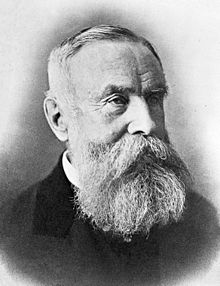Henry Jacob Bigelow | |
|---|---|
 | |
| Born | March 11, 1818 |
| Died | October 30, 1890 (aged 72) |
| Burial place | Mount Auburn Cemetery |
| Education |
|
| Occupation(s) | Professor, surgeon |
| Known for | Ligament of Bigelow |
| Children | William Sturgis Bigelow |
| Father | Jacob Bigelow |

Henry Jacob Bigelow (March 11, 1818 – October 30, 1890) was an American surgeon and Professor of Surgery at Harvard University. A dominating figure in Boston medicine for many decades, he is remembered for the Bigelow maneuver for hip dislocation, a technique for treatment of kidney stones, and other innovations.[1][2] He was instrumental in bringing the anesthetic possibilities of ether to the attention of medical men, and rescuing the case of Phineas Gage from relative obscurity. He was a vocal opponent of vivisection, and played a minor role in the apprehension of the culprit in the Parkman–Webster murder case.
- ^ Kelly, Howard A.; Burrage, Walter L. (eds.). . . Baltimore: The Norman, Remington Company.
- ^ Bigelow, William Sturgis; Bigelow, Henry Jacob (1894). A Memoir of Henry Jacob Bigelow. Boston: Little, Brown, and Company. Retrieved May 20, 2017.